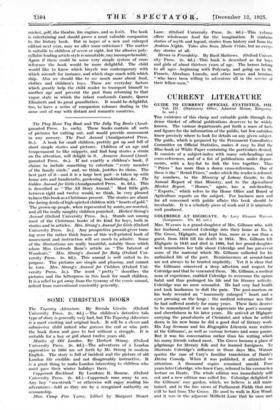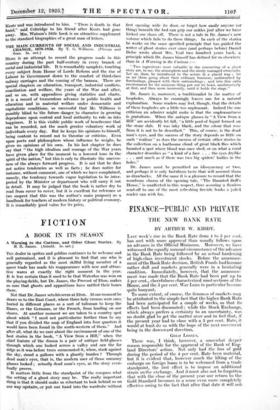COLERIDGE AT HIGHGATE. By Lucy Eleanor Watson. (Longman. 10s. 6d.
net.) -111as. WATSON is a grand-daughter of Mrs. Gillman who, with her husband, received Coleridge into their home at No. 3, The Grove, Highgate, and kept him, more as a son than a guest, from 1816 till his death in 1834. Mrs. Gillman left Highgate in 1843 and died in 1860, but her grand-daughter well remembers her talk about Coleridge and has preserved some of the material which Mr. Gillman collected for his unfinished life of the poet. Reminiscences at second-hand are not always to be trusted impliditly: Yet it is clear that the Gillmans conceived a deep affection and respect for Coleridge and that he venerated them. Mr. Gillman, a medical man of experience, enabled Coleridge to overcome the opium habit and thus prolonged his life and his literary activity., Coleridge was no mere sensualist. He had very bad health: and took laudanum to dull the pain. The post-mortem on hiS body revealed an " immensely enlarged " heart and a , cyst pressing on the lungs ; the medical inference was that, he had suffered acutely for many- years. These facts deserve to be remembered if we are to. appreciate the poet's courage and cheerfulness in his later years. He arrived at Highgate carrying the proof-sheets of Christabel, and when he settled down in his new home he did a good deal of literary work. His Lay- Sermons and his Biographia- Literaria were Written at the Gillman', as well as various lectures and some poems. But it was his conversation rather than his writing which his many friends valued most. The Grove became a place of pilgrimage for literary folk and for learned foreigners. To illustrate Coleridge's influence in those days Mrs. Watson quotes the case of Cary's familiar translation of Dante's Divine Comedy. When it was published, it attracted no attention.. A thousand copies remained unsold. Four years later Coleridge, who knew Cary, referred to his version in a lecture on Dante. The whole edition was immediately sold out and a new edition was called for. Coleridge delighted in the Gillmans' rose garden, which, we believe; is still main- tained, and in the fine views of Parliament Fields that may still be had from The Grove. He used to walk in Ken Wood, and it was -in the adjacerd'llillfield -Lane that he 'once met Keats and was introduced to him. " There is death in that hand," said Coleridge to his friend after Keats. had gone away. Mrs. Watson's little book is an attractive supplement to the standard biographies of a great man of letters.























































 Previous page
Previous page